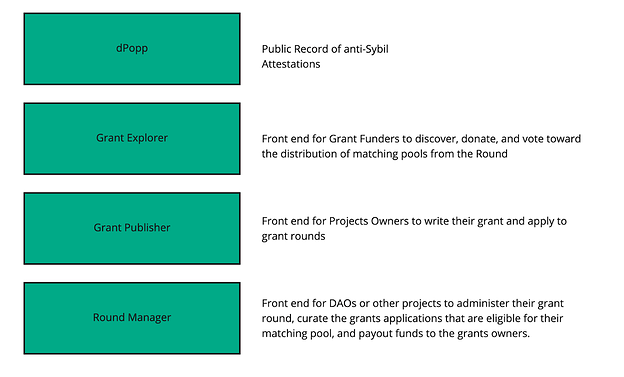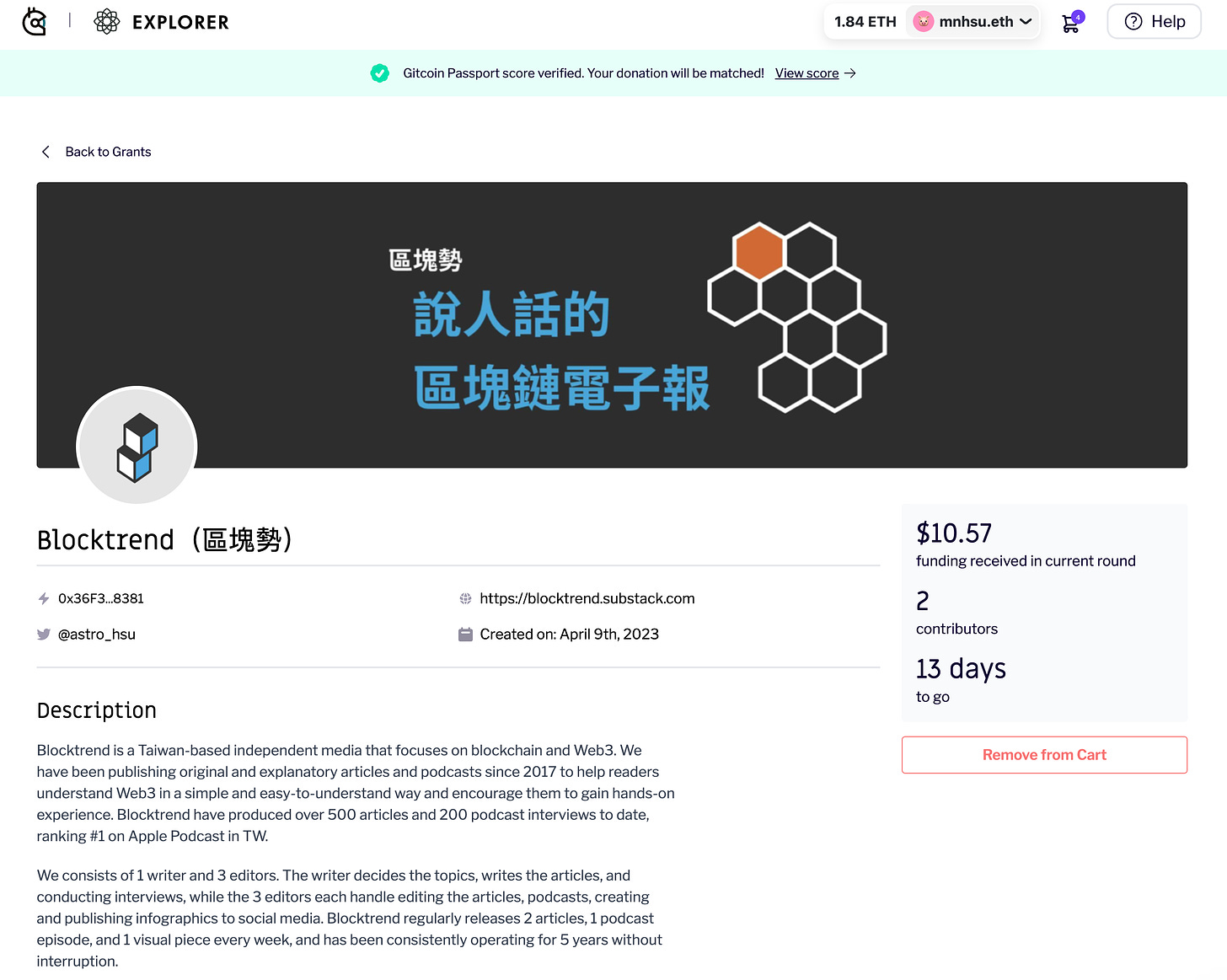GM,
Starting today until May 9th is the voting period for the Gitcoin Grants Beta Round, and Blocktrend is also a participant in this round of Gitcoin Grants.
Gitcoin uses Quadratic Funding, allowing the public to decide how to allocate a total of $1.25 million in grants through small change voting. The more people vote for Blocktrend with the cost of a bus or subway ride, the higher the proportion of the $1.25 million grant we can receive.
This article will first explain why this round of Gitcoin Grants fundraising is called the "Beta Round" and how to choose suitable projects to vote for?
Opening the Door to Building a Car
Gitcoin is a company that entered the blockchain field in 2017, at the same time as Blocktrend.
Gitcoin's founder, Kevin Owocki, has been working in technology at many startups since 2008, eventually becoming a Director of Engineering and CTO. However, he realized that a significant portion of the products the team built were due to open-source software on the internet. Recruiting new people to "reinvent the wheel" was not very beneficial and even had negative effects. Therefore, he preferred the "open the door to build a car" approach in his work.
As a result, Kevin Owocki built the first Gitcoin prototype product, later known as Gitcoin Bounty. Its function is similar to online outsourcing platforms, such as YouTubers offering a $100 USDT reward for adding subtitles to a video or businesses asking someone to add new features to open-source software. However, this model was too similar to the gig economy and didn't fit the work culture of open-source software. Therefore, he continued to develop products like Kudos and Gitcoin Grants.
Kudos is a type of NFT, a simple version of Hypercerts - attracting people to contribute their skills with honor badges, which may lead to unexpected rewards. However, in retrospect, most people who received the badges could only collect them for themselves without any additional benefits. On the other hand, Gitcoin Grants was quite successful, and at the time, it was the first to adopt the Quadratic Funding (QF) method to allocate funds, which most people have heard but not fully understood.
In the beginning, the first round of Gitcoin Grants in 2019 had a total of $25,000 in matched funds, attracting 200 small donations to participate in the fund allocation. Later, as the number of small donations increased - 400, 2,000, 5,000 - within a year, the 5th round of Gitcoin Grants had attracted up to 8,000 donations. More and more people realized that Quadratic Funding is a magical mechanism that helps projects receive matching funds by simply voting with small change.
At the same time, more and more institutions or individuals were willing to generously donate matching funds to Gitcoin Grants, hoping to contribute to the development of Web3 and public goods.
Gitcoin Grants became popular and has now completed 17 rounds of fund allocation, becoming synonymous with Gitcoin and Quadratic Funding. However, as the matching funds for Gitcoin Grants increased, so did the problems of scaling.
Platform to Tools
The most headache-inducing issue is zombie accounts, also known as Sybil Attacks.
As the grant funding in Gitcoin Grants increases, so do "social hackers." They don't look for code vulnerabilities but loopholes in the rules. Since Quadratic Funding values "more people over more money," social hackers try to create many zombie accounts to help their projects receive grant funding.
In addition to combating zombie accounts, Gitcoin Grants has to manually screen each project to ensure its legitimacy and alignment with the definition of public goods. Otherwise, it could lead to controversy or even legal violations. Moreover, there are more and more fundraising mechanisms for public goods. Blocktrend recently participated in RetroPGF, and now there's Quadratic Funding. In the future, there might be even more new mechanisms emerging, competing with each other.
To address these issues, Gitcoin's approach is to transition from a (centralized) platform to a (decentralized) toolset.
Gitcoin is well aware that without decentralization, it would quickly face the same problems as centralized community platforms, and regulatory intervention would only make matters worse. In March 2022, Kevin Owocki proposed the concept of Grants 2.0. Simply put, it modularizes the features of the original Gitcoin Grants platform, splitting them into different protocols for easy reassembly at any time.
In the future, people can combine Gitcoin Grants like Lego bricks, using it as a base for funding and creating unique applications tailored to their needs.
For example, in the past, Gitcoin had to find ways to identify zombie accounts within its centralized platform, and either being too lenient or too strict would leave some people unsatisfied. But in the future, each company that wants to host a grant can choose the appropriate identity verification tool and combine it with Gitcoin Grants. The biggest advantage of decentralization is allowing people to combine different solutions according to their needs. Unsatisfied with the current situation? Try building your own.
Gitcoin will no longer need to unilaterally decide what constitutes public goods and won't necessarily have to be tied to Quadratic Funding. In the future, even RetroPGF events hosted by Optimism could directly use Gitcoin Grants' frontend website and identity verification module.
Ultimately, Gitcoin Grants will become like a "kitchen knife." How people choose to use it is beyond Gitcoin's control. If someone commits a crime with a kitchen knife, the craftsman won't be arrested.
However, transitioning from a centralized platform to decentralized protocols isn't easy. Much like centralized and decentralized exchanges, most of the code cannot be reused, and everything has to start from scratch. To most users, Gitcoin undoubtedly appears to be crippling itself. Particularly for older users, the familiar interface and features they've grown accustomed to over the past three years have been completely changed, leading to complaints like, "This used to work, why not now?"
The decentralized version of Gitcoin Grants first appeared in January 2023, known as the Alpha Round. This is the second time a decentralized infrastructure is used for fundraising, hence being called the Beta Round.
Beta Round
If you've decided to vote for Blocktrend, just click this link, and you can add it to your cart on the right side of the screen. However, if you haven't completed the Gitcoin Passport identity verification beforehand, your small change donation won't have any voting impact.
Gitcoin Passport is an identity verification mechanism created by Gitcoin to address the issue of zombie accounts. Participants can earn identity points for each completed identity verification. This round of Gitcoin Grants only allows users with an identity score of 15 or higher to participate in voting; scores lower than this are classified as robots — the project can receive your donation, but not the matching funds.
This round of Gitcoin Grants has a total of $1.25 million in matching funds, divided among five major themes: climate change, open-source software, ZK technology, community education, and infrastructure. Blocktrend is one of the 204 projects in the community education category, and can be found by searching for "Blocktrend" or "區塊勢."
But besides Blocktrend, what other projects can you vote for?
Unlike the previously held RetroPGF simulation vote, which is a "post-hoc" recognition of impact grants, the ideal choice at the time was to vote for products or services that you were using and had already had a significant impact in a specific field. However, my voting criteria for Gitcoin Grants will be more relaxed, in addition to voting for products I use, I will also support projects with similar ideas but without outstanding achievements yet.
"Nowhere Publishing" is an example. I mentioned the difference between e-books and NFT books in "Redefining Digital Publishing with NFT".
To solve the piracy problem, "traditional" e-books require the e-book to be bound to a specific reader. The usage rules are even more stringent than paper books, and even lending to friends depends on the reader's discretion.
NFT is a balance between openness and closure. Technically, the content of NFT books can circulate freely. After I download the PDF, ePub files of the book and forward them, you can get the same content even without spending money. But only those who pay can get their exclusive NFT. Open content but closed community allows content to circulate while paid readers can find like-minded people.
“Nowhere Publishing" publishes NFT books for creators. Although it is still in its early stages, I will donate because I recognize this similar concept.
Each donation doesn't need to be much, just the equivalent of bus or subway fare. The focus of quadratic funding is to help projects get matching funds by voting with small change, not the donation itself. The more people, the more important than the money. If you have extra funds, it would be more helpful to give them to friends and invite them to participate in the vote.
So far, you may not have felt the inconvenience of the Beta Round. Until you hit the checkout button.
This round of Beta Round only allows people to participate in voting with DAI and ETH cryptocurrencies. In addition, only transactions sent from the Ethereum mainnet are supported, not other second-layer networks such as zkSync or Optimism. This can be said to be the biggest weakness of the Beta Round and the biggest obstacle for many donors.
Although the current Ethereum miner fees are much lower than the sky-high fees during the bull market, they are still not affordable. Each transaction still costs around $4 in miner fees. If I donate $3 to four different projects at the same time, totaling $12 in donations, the transaction fee will be $4, totaling $16, with the fee accounting for 1/4.
In the past, the centralized version of Gitcoin Grants supported zkSync payments, effectively reducing donation fees to 10 TWD or even lower. However, this round of decentralized Gitcoin Grants does not yet support second-layer networks, which will affect people's willingness to vote with small change. It's okay if you miss this round, as Gitcoin Grants are held every quarter. Each small change vote from people is supporting the development of public goods, allowing for more publicly-funded open content on the internet.
Blocktrend is an independent media outlet sustained by reader-paid subscriptions. If you think the articles from Blocktrendare good, feel free to share this article, join the member-created Discord for discussion, or add this article to your Web3 records by collecting the Writing NFT.
In addition, please recommend Blocktrend to your friends and family. If you want to review past content published by Blocktrend, you can refer to the article list. As many readers often ask for my referral codes, I have compiled them into a single page for everyone's convenience. You are welcome to use them.





